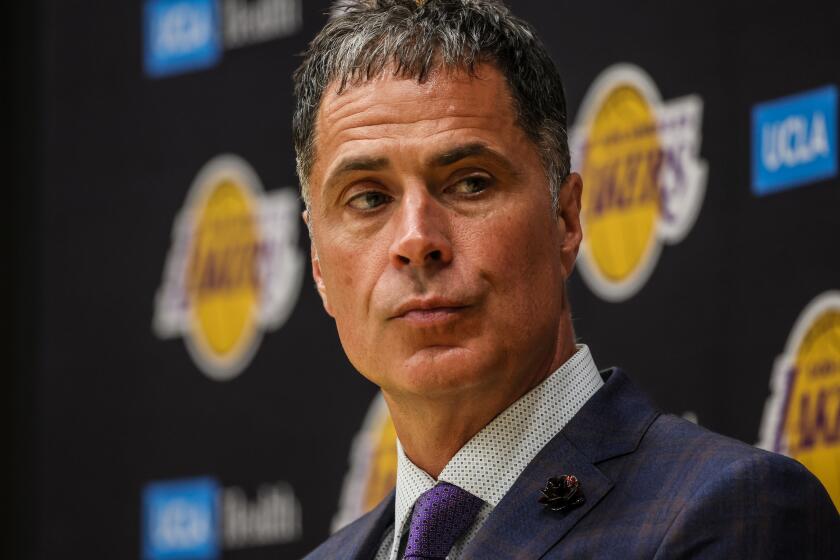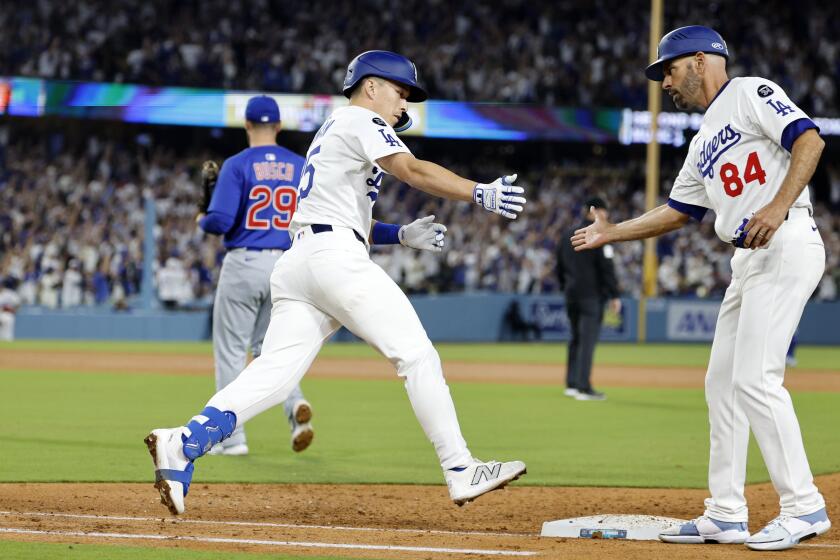Rubin Laughed All the Way to Bank, Hall of Fame : Horse racing: Owner makes it on John Henry’s back. Velasquez, McAnally, Sheppard also inducted.
- Share via
SARATOGA SPRINGS, N.Y. — Sam Rubin, who wisecracked his way through the career of John Henry, a horse who earned $6.5 million after Rubin bought him for $25,000, hasn’t retired as a stand-up comic.
On an occasion that sometimes is solemn and tearful, Rubin and Dick Francis, the former British steeplechase jockey who became a best-selling mystery novelist, made levity the pattern of the day Thursday as four horses, two trainers and a jockey were admitted into racing’s Hall of Fame.
The induction ceremony, held under a large tent next to the Hall of Fame and across the street from the Saratoga track, was attended by more than 1,000 people, among them 34 enshrined trainers and jockeys invited back for the hall’s 40th anniversary.
Francis, who lives in Florida and was visiting Saratoga for the first time, told jokes. Later, after John Forsythe presented John Henry’s plaque to Rubin, the horse’s owner laughed at himself for his lack of racing expertise both before and after he bought the horse.
Also inducted were Ron McAnally, who has trained John Henry and about 90 other stakes-winning horses; Jonathan Sheppard, America’s premier steeplechase trainer; and jockey Jorge Velasquez, who is still riding after winning more than 6,000 races.
Besides John Henry, other horses inducted were All Along, the brilliant grass filly from France who won horse-of-the-year honors in the United States in 1983; Bimelech, winner of the Preakness and Belmont Stakes in 1940; and Zaccio, the champion steeplechase horse in 1980-82.
Rubin, 75, is a New York bicycle importer and lifelong horseplayer who owned only a few insignificant horses until John Henry, a mean-spirited gelding who had already gone through seven owners, came along in 1978.
Rubin recalled Thursday how he told his wife, Dorothy, that he was going to spend about $50,000 on a couple of so-so horses and have some fun. Rubin was quickly put in touch with Harold Snowden, the owner of John Henry, through a bloodstock agent.
“I gave 10% of the sale price to the agent,” Rubin said. “I didn’t know that I wasn’t supposed to pay the commission.”
John Henry was sent from Kentucky to New York for a physical inspection before the sale could be completed.
“ ‘This horse is in at the knees (knock-kneed),’ ” Rubin said he was told by veterinarian Manny Gilman.
“ ‘That’s good,’ ” Rubin said he naively replied.
Rubin first sent John Henry to trainer Bobby Donato, who looked at the horse and said to the owner: “This horse has a grass foot.”
Rubin said he didn’t know what that meant, either.
“I looked down at the ground and didn’t see any grass,” he said Thursday.
The term refers to feet that are smaller than usual, which indicate that a horse will run well on turf.
John Henry won seven Eclipse Awards, including four grass championships, and was voted horse of the year in 1981 and 1984, the second time as a 9-year-old. Now 15, John Henry is stabled at the Kentucky Horse Park in Lexington, where the public can visit him.
McAnally thanked the late Maxwell Gluck, the owner of Elmendorf Farm, for being responsible for the trainer’s getting John Henry when Rubin transferred the horse to California in 1979.
“When you’re young, you have many dreams, both night and day,” McAnally said. “One of my dreams was to have a horse of this caliber. I’ll be with him forever, and as long as he’s around, I’ll be around.”
McAnally, his mother dead and his father unable to support a large family, lived in a Kentucky orphanage for several years before he was introduced to racing’s backstretch by his uncle, Reggie Cornell.
An Englishman, Sheppard bought a one-way ticket on a cargo ship to the United States in 1961.
“I was 21, and I sold my second-hand car and my second-hand horse,” Sheppard said. “All I had when I got off the boat was $100 in my pocket and the addresses of some distant cousins in Connecticut.”
Sheppard thanked Burley Cocks for getting him started in the United States. Cocks, one of the Hall of Fame members present Thursday, trained Zaccio.
Velasquez, dressed in a gray morning coat, accepted his plaque from Eddie Arcaro, a jockey who was inducted in 1958.
“I’m very happy, and a little nervous,” Velasquez said. “But the day has arrived and I’m tickled to death. I’m very glad to belong to this very special group of champions. I thank God that He gave me this special life.”
Horse Racing Notes
Open Mind, last year’s champion 3-year-old filly, makes her first start today since winning the Breeders’ Cup Distaff last November. She won’t be favored, however, in Saratoga’s Ballerina, because the field includes Stormy But Valid, the California shipper who has won three stakes at Santa Anita and Hollywood Park this year. . . . Angel Cordero, who rode Open Mind to eight victories and two thirds in 11 starts last year, took a call on Stormy But Valid when he thought Open Mind wouldn’t be running today. Gary Stevens has the mount on Open Mind.
On Saturday, the two best 3-year-old fillies in the country, Go for Wand and Charon, will run at Saratoga in the Alabama. . . . Steinlen is set to run Sunday in the Bernard Baruch Handicap.
Johnny Longden, inducted into the Hall of Fame as a jockey in 1958, called the hall last week, canceling his appearance at the ceremonies. Ralph Neves was another absent jockey. Among the trainers missing were Woody Stephens and Bill Winfrey.
Cordero, leading jockey at Saratoga for 13 of the last 14 years, received a court stay on a 10-day suspension and his case won’t be reviewed until the end of the year. . . . Jose Santos, the jockey who broke Cordero’s Saratoga streak in 1987, didn’t contest a five-day suspension and began the meeting on the sidelines.
The factions in the expected proxy fight at Hollywood Park over the status of track president Marje Everett estimate that legal fees will cost each side $2 million. Everett’s fees would come from track coffers and the opposition’s costs would have to be privately paid. . . . Bob Strub, chief executive officer at Santa Anita, said it is still possible that the track will get the Breeders’ Cup in 1992, but negotiations have hit several snags. One point of disagreement is how much Santa Anita must charge its season-ticket holders. Strub feels that the prices suggested by the Breeders’ Cup are considerably higher than they should be.
More to Read
Go beyond the scoreboard
Get the latest on L.A.'s teams in the daily Sports Report newsletter.
You may occasionally receive promotional content from the Los Angeles Times.










